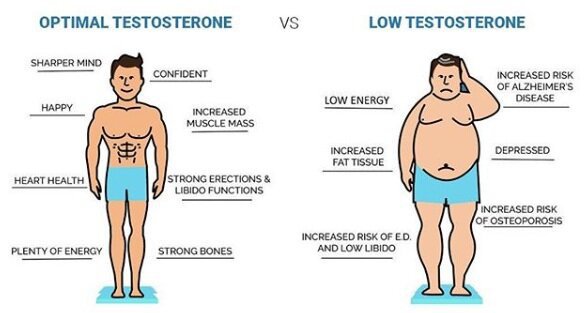How to Skyrocket Your Testosterone Levels with These Simple Lifestyle Changes

Understanding the Importance of Testosterone Levels

Testosterone, a hormone primarily produced in the testicles, plays a crucial role in various aspects of men’s health. It is responsible for the development of male sexual characteristics during puberty, including facial and body hair growth, deepening of the voice, and the increase in muscle mass and bone density. Beyond sexual functions, testosterone also affects mood, cognitive abilities, and overall energy levels.
Maintaining optimal testosterone levels is vital for overall well-being, as imbalances can lead to a range of health issues. Low testosterone levels, also known as hypogonadism, can result in symptoms such as decreased libido, fatigue, increased body fat, reduced muscle mass, and even depression. On the other hand, elevated levels of testosterone can contribute to mood swings, aggression, and an increased risk of cardiovascular problems.
Understanding the importance of testosterone levels is crucial for men of all ages. From puberty through to old age, this hormone plays a critical role in physical, emotional, and mental health. By recognizing the signs and symptoms of low testosterone, individuals can take proactive steps to address imbalances and optimize their overall well-being. Through lifestyle choices such as proper sleep, regular exercise, balanced nutrition, and reducing stress levels, individuals can positively influence their testosterone production and maintain healthy hormone levels. Additionally, seeking professional guidance from healthcare providers can provide further insights and personalized strategies for testosterone optimization. By prioritizing testosterone levels, men can enhance their overall quality of life and ensure long-term health and vitality.
The Role of Testosterone in Men’s Health

Testosterone plays a crucial role in men’s health, affecting various aspects of their physical, mental, and emotional well-being. It is the primary male sex hormone, responsible for the development and maintenance of male reproductive tissues. Testosterone also influences muscle mass and strength, bone density, red blood cell production, and fat distribution in the body. Additionally, this hormone plays a vital role in cognitive function, mood regulation, and overall energy levels.
Low testosterone levels can have detrimental effects on men’s health. It can lead to reduced libido, erectile dysfunction, decreased muscle mass, increased body fat, and decreased bone density, putting men at a higher risk of osteoporosis. Mental health issues such as depression, poor concentration, and fatigue are also commonly associated with low testosterone. Therefore, maintaining optimal testosterone levels is crucial for men to support their overall health and well-being. By understanding the role of testosterone and taking necessary steps to optimize its levels, men can navigate the potential challenges associated with hormonal imbalances and lead a healthier life.
Identifying Signs and Symptoms of Low Testosterone

Low testosterone, also known as hypogonadism, can have a significant impact on a man’s overall well-being. Identifying the signs and symptoms of low testosterone is crucial for early detection and appropriate treatment.
One of the most common symptoms of low testosterone is a decrease in sexual desire or libido. Men may also experience erectile dysfunction or difficulty achieving and maintaining an erection. Additionally, low testosterone can contribute to a decrease in muscle mass and strength, as well as an increase in body fat. Fatigue, mood changes, and decreased motivation or drive are also potential indicators of low testosterone levels.
It is important to note that these symptoms can vary from person to person, and some men may experience only a few of them. Furthermore, many of these symptoms can also be attributed to other medical conditions. Therefore, if you are experiencing any of these signs, it is crucial to consult with a healthcare professional for a proper evaluation and diagnosis.
The Impact of Lifestyle Choices on Testosterone Levels
Lifestyle choices play a significant role in maintaining optimal testosterone levels in men. Several factors, such as diet, sleep patterns, exercise habits, and stress management, can either support or hinder testosterone production.
Proper nutrition is essential for testosterone production. Consuming a balanced diet rich in essential nutrients, such as zinc, vitamin D, and magnesium, can positively influence testosterone levels. Studies have shown that diets lacking in these key nutrients may lead to lower testosterone levels. Incorporating testosterone-boosting foods like red meat, fish, nuts, and seeds into your diet can help support testosterone production.
Exercise is another lifestyle choice that can have a profound impact on testosterone levels. Regular physical activity, especially strength training exercises, has been shown to increase testosterone production. Engaging in weightlifting, resistance training, or high-intensity interval training (HIIT) can help boost testosterone levels. On the other hand, leading a sedentary lifestyle can contribute to decreased testosterone production.
It is evident that lifestyle choices can significantly influence testosterone levels in men. By adopting a healthy diet, incorporating regular exercise, and implementing strategies to manage stress effectively, it is possible to support optimal testosterone production. In the following sections, we will delve deeper into these lifestyle factors and explore ways to optimize testosterone levels for overall health and well-being.
• Proper nutrition is essential for testosterone production
– Consuming a balanced diet rich in zinc, vitamin D, and magnesium can positively influence testosterone levels
– Diets lacking these key nutrients may lead to lower testosterone levels
– Testosterone-boosting foods include red meat, fish, nuts, and seeds
• Exercise has a profound impact on testosterone levels
– Regular physical activity, especially strength training exercises, increases testosterone production
– Weightlifting, resistance training, and HIIT can help boost testosterone levels
– Leading a sedentary lifestyle contributes to decreased testosterone production
• Lifestyle choices significantly influence testosterone levels in men
– Adopting a healthy diet and incorporating regular exercise supports optimal testosterone production
– Effective stress management strategies are important for maintaining healthy hormone balance
In the following sections of this article, we will delve deeper into each of these lifestyle factors and explore ways to optimize testosterone levels for overall health and well-being.
Prioritizing Quality Sleep for Optimal Testosterone Production
Getting quality sleep is not just important for overall well-being, but it also plays a crucial role in maintaining optimal testosterone levels in men. Testosterone, often referred to as the “male hormone,” is responsible for a multitude of functions in the body, including muscle growth, bone density, and sexual health. Without enough quality sleep, these functions can be adversely affected.
Research has shown that insufficient or poor-quality sleep can lead to a decrease in testosterone levels. In one study, a group of healthy young men were restricted to only 5 hours of sleep per night for one week. At the end of the study, their testosterone levels had dropped by a significant 10-15%. This decline in testosterone can have negative implications for men’s health, potentially leading to decreased energy levels, reduced muscle mass, and even erectile dysfunction.
The exact mechanisms by which sleep affects testosterone production are still being studied, but it is believed to be linked to the release of hormones such as luteinizing hormone (LH) and follicle-stimulating hormone (FSH), which are important in the regulation of testosterone. Additionally, sleep deprivation is associated with increased levels of cortisol, a stress hormone that can further disrupt testosterone production.
To prioritize quality sleep for optimal testosterone production, it is important to establish a consistent sleep routine and aim for 7-9 hours of uninterrupted sleep per night. Creating a conducive sleep environment, practicing good sleep hygiene, and managing stress levels are also crucial. Making sleep a priority not only promotes overall health and well-being but also supports healthy testosterone levels in men.
The Power of Regular Exercise in Boosting Testosterone
Regular exercise not only helps maintain overall health and fitness, but it also plays a crucial role in boosting testosterone levels in men. Research has shown that engaging in consistent physical activity can greatly impact testosterone production and help optimize hormonal balance.
Exercise has been shown to increase testosterone levels both during and after physical activity. This is because exercise stimulates the release of endorphins, which in turn signal the body to produce more testosterone. Additionally, certain types of exercise, such as resistance training and high-intensity interval training (HIIT), have been found to be particularly effective in increasing testosterone levels. These types of exercise involve challenging the muscles and creating an environment that promotes testosterone production.
Here’s a summary of the power of regular exercise in boosting testosterone:
| Exercise Type | Impact on Testosterone | Source of Information |
|---|---|---|
| Resistance Training | Increases testosterone levels, especially with compound exercises and high-intensity workouts. | Sports Medicine. 2017 Dec;47(12):2441-2475 |
| High-Intensity Interval Training (HIIT) | Can lead to short-term increases in testosterone levels. | Endocrinology and Metabolism. 2018 Mar;33(1):1-9 |
| Aerobic Exercise | May contribute to modest increases in testosterone levels, especially in overweight or sedentary individuals. | Journal of Endocrinology. 2013 Apr;217(1):9-17 |
| Combined Training | Combining resistance and aerobic exercises may have a synergistic effect on testosterone levels. | Journal of Strength and Conditioning Research. 2014 Apr;28(4):1106-17 |
| Long-Term Regular Exercise | Consistent, long-term exercise is associated with higher baseline testosterone levels. | European Journal of Applied Physiology. 2016 Jul;116(7):1383-93 |
Balancing Stress Levels to Maintain Healthy Testosterone Levels
Stress is an integral part of our lives, but when it comes to testosterone levels, it can have a significant impact. High levels of stress can lead to a decrease in testosterone production, which in turn can affect a man’s overall health and well-being. This is because stress triggers the release of cortisol, a hormone that can inhibit the production of testosterone. Additionally, stress can lead to poor lifestyle choices such as unhealthy eating habits and lack of exercise, further exacerbating the issue. It is therefore crucial to find effective ways to balance stress levels in order to maintain healthy testosterone levels.
One effective strategy for balancing stress levels is to incorporate stress-reducing activities into your daily routine. This could include practicing mindfulness or meditation, engaging in regular physical exercise, or participating in activities that bring you joy and relaxation. Finding healthy ways to manage stress can not only help improve your testosterone levels, but also have a positive impact on your overall mental and physical well-being. Additionally, seeking support from friends, family, or a healthcare professional can be beneficial in managing stress and maintaining optimal testosterone levels. Adopting a holistic approach to stress management is key to achieving overall hormonal balance and optimizing your health.
The Role of Proper Nutrition in Supporting Testosterone Production
Proper nutrition plays a crucial role in supporting testosterone production in men. Testosterone, a hormone primarily produced in the testes, is responsible for various physiological functions, including muscle growth, bone density, and reproductive health. Therefore, it is essential to incorporate a well-balanced diet that promotes healthy testosterone levels.
A diet rich in certain nutrients can positively impact testosterone production. For instance, adequate intake of protein is imperative as it provides the building blocks for testosterone synthesis. Foods such as lean meats, poultry, fish, eggs, and dairy products can help meet protein requirements. Additionally, consuming healthy fats like those found in avocados, nuts, and olive oil can be beneficial, as testosterone production relies on cholesterol, which is a precursor to this hormone.
Moreover, including a variety of fruits and vegetables in the diet is crucial for supporting testosterone production. These foods are rich in antioxidants, vitamins, and minerals, which help reduce oxidative stress and promote overall well-being. Some examples of testosterone-boosting foods include spinach, broccoli, oranges, berries, and papaya. It is important to note that maintaining a well-rounded diet, rather than relying on specific “miracle” foods, is key to supporting testosterone production.
In conclusion, nutrition plays a significant role in supporting testosterone production in men. By incorporating a well-balanced diet that includes protein, healthy fats, fruits, and vegetables, individuals can support optimal testosterone levels. However, it is crucial to consult with a healthcare professional or a registered dietitian to tailor a nutrition plan that fits individual needs and preferences. Taking a holistic approach to nutrition and overall wellness can be highly beneficial in maintaining healthy testosterone levels for optimal male health.
Incorporating Testosterone-Boosting Foods into Your Diet
Testosterone is a crucial hormone that plays a vital role in men’s health, including muscle growth, bone density, and libido. While there are various ways to optimize testosterone levels, one effective approach is through incorporating testosterone-boosting foods into your diet. These foods are rich in nutrients that have been shown to support testosterone production and promote overall hormonal balance.
One group of foods that has been linked to increased testosterone levels is cruciferous vegetables. These include broccoli, cauliflower, cabbage, and Brussels sprouts. These vegetables contain a compound called indole-3-carbinol, which helps the body break down excess estrogen and prevent it from interfering with testosterone production.
Another food group to focus on is zinc-rich foods. Zinc is an essential mineral that plays a significant role in testosterone synthesis. Oysters, beef, lamb, and pumpkin seeds are excellent sources of zinc. Research has shown that men with zinc deficiency have lower testosterone levels, highlighting the importance of incorporating these foods into your diet.
In addition to cruciferous vegetables and zinc-rich foods, it’s important to include foods high in healthy fats. Testosterone is synthesized from cholesterol, so consuming healthy fats can provide the building blocks needed for optimal testosterone production. Avocados, olive oil, coconut oil, and fatty fish like salmon are all great choices to incorporate into your diet.
Furthermore, it’s worth noting that incorporating foods rich in vitamin D can also be beneficial for testosterone production. Research has shown that vitamin D deficiency is associated with decreased testosterone levels. Foods such as fatty fish, mushrooms, fortified dairy products, and egg yolks can help ensure adequate vitamin D intake.
Incorporating testosterone-boosting foods into your diet is an excellent strategy to naturally optimize hormone levels. However, it’s important to remember that a balanced and varied diet is key for overall health. Consulting with a healthcare professional or nutritionist can provide personalized guidance and ensure an appropriate nutritional plan tailored to your individual needs.
Avoiding Excessive Alcohol Consumption for Optimal Testosterone Levels
Excessive alcohol consumption has been shown to have negative effects on testosterone levels in men. Alcohol is known to disrupt the process of testosterone production by interfering with the function of the testes. Studies have indicated that chronic alcohol consumption can lead to decreased testosterone levels, resulting in various health issues such as decreased libido, infertility, and decreased muscle mass.
Furthermore, alcohol can affect the liver’s ability to metabolize estrogen, resulting in an imbalance between estrogen and testosterone levels in the body. This hormonal imbalance can further contribute to a decrease in testosterone levels. It is important to note that even moderate alcohol intake can have a detrimental effect on testosterone production, although the severity may vary from individual to individual. Thus, it is advisable for men looking to optimize their testosterone levels to limit their alcohol consumption and practice moderation.
The Importance of Vitamin D for Testosterone Production
Vitamin D plays a crucial role in maintaining optimal testosterone levels in men. This essential nutrient helps regulate the production and function of testosterone, a hormone that is vital for men’s health and well-being. Research has shown that low levels of vitamin D are associated with decreased testosterone levels, while supplementation with vitamin D can help increase testosterone levels.
One study conducted on a group of men with vitamin D deficiency found that after receiving vitamin D supplementation for one year, their testosterone levels significantly improved. Another study found that men with low levels of vitamin D had lower testosterone levels compared to men with normal vitamin D levels. These findings suggest a strong correlation between vitamin D status and testosterone production.
The exact mechanism through which vitamin D affects testosterone production is not fully understood. However, it is believed that vitamin D plays a role in the regulation and synthesis of testosterone in the testes. Vitamin D receptors are present in testicular cells, indicating a direct impact on the production of testosterone. Additionally, vitamin D is involved in the production of sex hormone-binding globulin (SHBG), a protein that binds to testosterone and regulates its availability in the body. Optimal levels of vitamin D can help ensure healthy testosterone production and balance in men.
To ensure sufficient vitamin D levels, it is recommended to obtain sunlight exposure and consume vitamin D-rich foods such as fatty fish, fortified dairy products, and egg yolks. However, it may be challenging to achieve optimal vitamin D levels through diet and sunlight alone, especially for individuals with limited sun exposure or specific dietary restrictions. In such cases, supplementation with vitamin D under the guidance of a healthcare professional may be necessary to support testosterone production and overall health.
It is important to note that individual vitamin D requirements may vary, and it is best to consult with a healthcare provider to determine the appropriate dosage based on factors such as age, health condition, and existing vitamin D levels. With proper attention to vitamin D intake, men can optimize their testosterone levels and contribute to overall well-being.
Strategies for Reducing Exposure to Endocrine Disruptors
Exposure to endocrine disruptors can have detrimental effects on testosterone levels. Endocrine disruptors are chemicals that can interfere with the body’s hormonal system, including testosterone production. These disruptors are commonly found in everyday products such as plastics, pesticides, and certain cleaning agents. To reduce exposure to these harmful substances, it is important to make conscious choices when it comes to the products we use.
One effective method for reducing exposure to endocrine disruptors is to opt for natural and organic alternatives. This can include using organic cleaning products free from harmful chemicals, choosing fresh and organic produce to minimize pesticide exposure, and avoiding plastic containers for food storage. By opting for natural alternatives, individuals can significantly reduce their exposure to endocrine disruptors and safeguard their testosterone levels.
Another strategy for reducing exposure to endocrine disruptors is to be mindful of personal care products. Many personal care products, such as soaps, shampoos, and deodorants, contain chemicals that can disrupt hormonal balance. Opting for natural and organic personal care products, which are free from harmful chemicals such as phthalates and parabens, can be beneficial for maintaining healthy testosterone levels. Additionally, individuals should make an effort to read labels and educate themselves about the potential risks associated with certain ingredients in personal care products.
Seeking Professional Guidance for Testosterone Optimization
When it comes to optimizing testosterone levels, seeking professional guidance can be a wise choice. While there are various lifestyle changes and dietary adjustments that can help promote healthy testosterone production, a healthcare professional specializing in hormone optimization can provide invaluable insights tailored to your specific needs.
A medical expert, such as an endocrinologist or urologist, can conduct comprehensive tests to assess your hormone levels and identify any underlying issues that may be contributing to low testosterone. Through a detailed medical history review and physical examination, they can determine the most appropriate course of action to optimize your testosterone levels.
In addition, a healthcare professional can provide guidance on the safe use of testosterone replacement therapy (TRT) if necessary. TRT involves the administration of testosterone through injections, patches, gels, or pellets to supplement the body’s natural testosterone production. It can be a viable option for individuals with clinically low testosterone levels, as determined by medical professionals. However, it is important to remember that TRT should only be used under the supervision of a qualified healthcare professional, as misuse or abuse can have serious health consequences.
By seeking professional guidance for testosterone optimization, you can ensure that your journey towards hormonal balance is based on sound medical advice and personalized treatment plans. With their expertise and knowledge, healthcare professionals can provide you with the necessary support and guidance to make informed decisions about your testosterone health.
What is testosterone and why is it important?
Testosterone is a hormone primarily found in males that plays a crucial role in various aspects of men’s health, including muscle mass, bone density, mood regulation, and sexual function.
How do I know if I have low testosterone levels?
Some common signs and symptoms of low testosterone include decreased libido, fatigue, reduced muscle mass, irritability, and difficulty concentrating. However, it is important to consult a healthcare professional to confirm a diagnosis.
Can lifestyle choices affect testosterone levels?
Yes, certain lifestyle choices can impact testosterone levels. Factors such as poor sleep quality, sedentary lifestyle, excessive stress, unhealthy diet, alcohol consumption, and exposure to endocrine disruptors can contribute to decreased testosterone production.
How does sleep affect testosterone production?
Quality sleep is essential for optimal testosterone production. Lack of sleep or poor sleep quality can disrupt hormone balance and decrease testosterone levels. It is recommended to prioritize getting sufficient, uninterrupted sleep to support testosterone levels.
Can exercise help boost testosterone levels?
Yes, regular exercise, especially resistance training, has been shown to increase testosterone levels. Engaging in physical activity, such as weightlifting or high-intensity interval training, can promote testosterone production and overall hormonal balance.
What role does stress play in testosterone levels?
Chronic stress can lead to elevated cortisol levels, which can negatively impact testosterone production. Balancing stress levels through relaxation techniques, stress management strategies, and self-care can help maintain healthy testosterone levels.
How does nutrition affect testosterone production?
Proper nutrition plays a vital role in supporting testosterone production. Consuming a well-balanced diet with sufficient protein, healthy fats, and essential vitamins and minerals can promote optimal hormone function.
Are there specific foods that can help boost testosterone levels?
Yes, certain foods are known to naturally support testosterone production. Examples include oysters, lean meats, eggs, nuts, avocados, broccoli, spinach, and garlic. Incorporating these testosterone-boosting foods into your diet can be beneficial.
Can alcohol consumption affect testosterone levels?
Excessive alcohol consumption can negatively impact testosterone levels. It is recommended to limit alcohol intake or avoid excessive drinking to maintain optimal testosterone production.
Why is vitamin D important for testosterone production?
Vitamin D is crucial for testosterone synthesis. Low levels of vitamin D have been associated with decreased testosterone levels. Spending time outdoors in the sun and consuming vitamin D-rich foods or supplements can help support healthy testosterone levels.
How can I reduce exposure to endocrine disruptors?
Endocrine disruptors are chemicals found in certain products, such as plastics, pesticides, and personal care items, that can negatively affect hormone balance, including testosterone. To minimize exposure, choose natural, organic products, avoid plastic containers, and be mindful of environmental toxins.
When should I consider seeking professional guidance for testosterone optimization?
If you suspect you have low testosterone levels or are experiencing symptoms related to hormonal imbalance, it is recommended to consult a healthcare professional. They can provide appropriate testing, diagnosis, and guidance on testosterone optimization strategies tailored to your specific needs.






